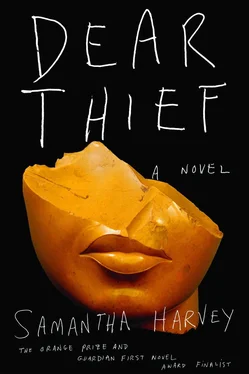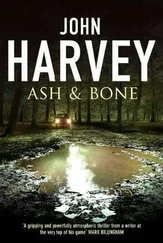Between Nicolas and Ruth it was agreed that posture was your problem. Probably you would be a lovely singer if only you were not one of life’s slouchers. I remember you looking at me with a collusive smile when they started straightening your back and asking you to envisage a plumb line through your core, and your vertebrae stacked like a ladder. You called: Do not let us grow crooked! You were then forced through some lessons in comportment, and you complied, walking up and down our long, narrow garden with an ashtray on your head whilst smoking. You would raise your arm and flick the ash around the vicinity of your crown. I don’t put this compliance down to your good nature particularly because, though I think your nature is many things, it is not good. I know you will be the first to agree. I put it down to this neutrality I talked about before. People want things from you because you interest and confound them — so, unbothered by any sense of self-preservation, or any sense of self at all, you offer what you have without analysis, expectation or defence. You deal yourself up, they play you.
That said, I think you were amused by that afternoon. I have often admired how careless you are with yourself. You walked up and down the garden with an ashtray on your head, then an empty glass, then a full glass; you ended up with ash and gin in your hair, you let Teddy blow the ash out. When you sat you resumed your wiry slouch with your foot up on the table, your ochre-tipped fingers tapping your knee and your beauty unknown and uninteresting to you.
‘You see, I’m not good at anything,’ you said, more with victory than self-pity.
‘Oh, come now,’ Nicolas replied.
Ruth leant across and put her fingers on your throat, reciprocating what you had done to her earlier. ‘You’d have a very good voice with training. But if you don’t stop smoking, God knows what will happen to it.’
‘Whatever it is,’ you said, ‘it won’t be half as bad as what’ll happen to my will to live if I do.’
Nicolas gestured in the direction of the house. ‘Not true that you’re good at nothing.’ And then to Ruth, ‘She takes good photographs, there’s one in there, if you want to see it.’
How hypocritical we can be; he spared you his previously stated view on the subject, his view that your still life was sordid, and then trite and obvious. And you spared him your knowledge that he was sparing you. ‘Oh, come now,’ you said simply.
‘I think you don’t believe in yourself enough.’
‘Oh, I believe in myself, I believe in almost nothing else, that’s my problem.’ And then, to Ruth, ‘But you are good at things, I can tell. Let me see, you’re a sculptor, or a lawyer.’
‘A paediatrician.’
‘Exactly,’ you said, and a genuine pleasure lit your face before you became suddenly inward — not sullen, but removed. I knew you had disliked Nicolas’ attempt at consolation and congratulation. You wanted to be obliterated, you wanted us to agree that you amounted to nothing, that you, your self, was eclipsed by your own fumbling, vulgar ineptitude. You would have been delighted to know that Nicolas had used the word sordid — you are delighted to know that, and as you read it off the page I bet a small thrill goes through you at this opportunity to take yourself and your sordidness out of the range of good people and cease to exist. And this is what I mean when I talk about your desire for others to be happy, just as you were glad to find that Ruth had a good voice and a vocation and was, as far as you had decided, happy. Ruth’s self was big enough to make yours redundant.
Soon after that you went to your room and stayed there until the next day. What I am guessing you don’t know is that later, when I went up to you, I found you lying on your bed still in the shorts and shirt, but with your shawl over your legs. Your left sleeve was rolled up above the elbow and that arm lay soft side up on the bed in surrender. I could see clearly the puncture from a needle. Your head was thrown back and your face unnervingly placid. At first I thought you were dead, but when I felt for a pulse it was firm and regular, if anything too insistent. There was no syringe, tourniquet or folded pocket of powder, but it would have been consistent with your sense of manners to put those back in the drawer or in your suitcase or under the bed, or wherever you kept them.
You were not asleep, but you had little idea of where you were. You knew somebody was in the room but I’m sure you didn’t know who, or which room. ‘Oh, to be a sick child and be in Ruth’s hands,’ you murmured with a smile. ‘Doesn’t she make you feel comforted somehow?’
‘Sshhh,’ I whispered deep into the well of your ear.
‘Do you think the name Butterfly becomes me?’ you asked from some blind depth. ‘Do you find me especially becoming ? No, you see, Teddy was mistaken. Me, I prefer Fly. Like John Clare in his poem to a butterfly. To see thee, Fly, warm me once more to sing . Ha! He takes her down a peg and owns her. You, Fly . Otherwise she’ll get above herself and flitter off to another poem, I think you know what I mean. Please, if you will, call me Fly. It is better. My feet are dirty, my feet are covered in shit.’
I pressed my hand on your head. ‘Sleep, Fly.’
Do you know, I always thought that perhaps Teddy wasn’t so wrong when he named you Butterfly, but that was a vague thought that I had out of motherly generosity. And yet just now I realised (I have just been standing at the window, thinking about it) how mistaken Teddy wasn’t , as if he saw something true that had always been there. That name actually was becoming, was unironic. Butterfly: settling on nothing, at the windowpane basking or trying to get out, batting at the light as if baffled by this lovely form that is (so it thinks) some fragile decoration of its ugliness. Do you know what I thought when you were lying there that evening? Instead of being angry that you had brought drugs into our house, I felt an unexpected sense of gratitude towards the needle that had given something back to you. Ah, I thought, so this is what is making you look so well! So bright-eyed and flushed with life. And I am certain you felt that exact gratitude when you guided the needle to the vein. For once you were not dealing yourself out, but were being dealt to. Nicolas said one time, when we were talking about your addiction, that you were a coward for escaping yourself, but I think that the opposite is at least worth arguing — that you were reclaiming yourself.
You looked so strong, well and calm, and I didn’t want the drug to ease off and drop you back to a slouch. Do not let us grow crooked , say the Vedas. We that kneel and pray again and again . I moved the shawl to cover your shoulders. We are all looking for miracles and small mercies, I mean this. Who are we to decide on another’s behalf what is miraculous, what is merciful?
That shawl of yours struck terror into the hearts of young men. You, aged twenty-one, would sit amongst the handful of young people from the village, around a limp fire in the woods or amidst a pile of beer bottles in a field or at the bottom of someone’s garden, and you would hardly speak. Just smoke, and play along at cards if the rest of us played. At that time you were in a phase of wearing Petras’ clothes, simply because, you said, you had grown into them and he had grown out of them. His brown and blue cords, his drainpipe jeans, his boots. You had not really grown into them, they were all too big for you. And always you wore your shawl, like a blanket laid neatly over an unmade bed. Through this complex crocheted honeycomb, this thick, soft network of deflection and obfuscation, sometimes, sometimes, sightings of your bare arms or inklings of female shape. But instantly lost again to the greater shapelessness that was your too-big shawl, this flocking of wool around your birchlike frame. As if, almost, you were giving shelter to the shawl and not the reverse.
Читать дальше












